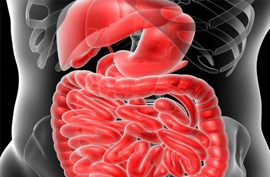What is gastrointestinal bleeding?
Gastrointestinal (GI) bleeding refers to bleeding that originates from the GI tract. The GI tract includes your esophagus, stomach, small intestine and large intestine. Bleeding is usually classified as upper GI or lower GI. Upper GI bleeding refers to any bleeding that originates from your esophagus, stomach or beginning portion of your small intestine. Lower GI bleeding refers to bleeding that originates from your colon or rectum. At times, bleeding can also occur from your small intestine termed mid-GI bleeding.
What are the symptoms of gastrointestinal bleeding?
The symptoms of upper GI tract bleeding can include vomiting of blood or vomit that looks like coffee grounds. Upper GI bleeding can also lead to diarrhea or bowel movements that resemble black tar. Lower GI bleeding results in bowel movements that are bloody. They can be dark red (maroon) to bright red in color. All types of bleeding can be associated with fatigue, weakness, lightheadedness, abdominal pain, pale skin and a racing heartbeat.
What are the causes of gastrointestinal bleeding?
• Ulcers of the stomach or small intestines
• Inflammation of the colon termed colitis
• Abnormal blood vessels along the lining of the intestines known as arteriovenous malformations
• Diverticulosis
• Variceal bleeding (swollen veins of the esophagus)
• Hemorrhoids
• Inflammatory bowel disease - Crohn’s disease or ulcerative colitis
• Cancer
How is gastrointestinal bleeding diagnosed?
Testing for gastrointestinal bleeding includes obtaining blood work for analysis which may show anemia (low blood cell counts), abnormal blood clotting function or liver dysfunction. Further evaluation of GI bleeding typically includes an upper endoscopy and/or colonoscopy (see our procedures section for more information). In cases where the bleeding source is believed to be from the small intestine, a capsule endoscopy may be performed which involves swallowing a pill sized camera which travels throughout the intestinal tract. There are imaging tests that are also used at times to help localize bleeding the source of the bleeding including a specialized CT scan and a nuclear bleeding scan.
What is the treatment of gastrointestinal bleeding?
Treatment of GI bleeding depends on how severe the bleeding is and where the bleeding is coming from. Some episodes of bleeding may resolve on their own. More severe bleeding can require supportive oxygen, intravenous fluids, blood transfusions and acid-suppressing medications. During an upper endoscopy or colonoscopy, your doctor can actively stop bleeding using a variety of different techniques including cautery, injection therapy, banding and the placement of clips to seal off blood vessels. It is important to be evaluated by your doctor to determine if any treatment or procedures may be required.
The information provided above is meant to be used as an informative guide for patients. For precise and individualized recommendations, please consult with one of our board certified gastroenterologists to discuss your symptoms.
For additional information or to book an appointment at the Gastroenterology Center of New York, please feel free to reach out to our dedicated team by calling us at 718-210-2960. You can also schedule online or reach out to us via the Contact Us form.
Questions? Our staff is always happy to assist.
Email us at info@gastrocenterofny.com or call us at 718.210.2960






